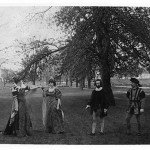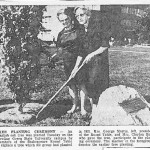Apr
5
Shakespeare Round Table highlights
April 5, 2011 | All, Local History, University Archives | Leave a Comment
April is not simply the month of rain that brings flowers in May; it’s the month to celebrate National Library Week (April 10-16), William Shakespeare’s birthday (observed on April 23), and Arbor Day (April 30). One group has related to all three of these events throughout Bowling Green’s history — The Shakespeare Round Table.
The Shakespeare Round Table is an organization for women interested in “a thorough study of the plays of William Shakespeare and related topics.” Founded in 1905 in Bowling Green, the Round Table started as an organization for women to come together and share not only their love of the great playwright, but also discuss his works in an intellectual, yet social, environment. Still in existence, members meet regularly, discussing the works of Shakespeare, presenting papers, and at times, even acting out the plays.
The Shakespeare Round Table made significant contributions to the founding of the Wood County District Public Library. In 1911, the Shakespeare Round Table focused on the need for a public library in Bowling Green and raised funds for one by hosting teas, socials, plays and bake sales. In 1914, they had enough money to rent out two rooms at the back of the Exchange Bank to use as a library. They purchased books and its members even volunteered there as staff. Over the years, this original effort evolved into the Wood County District Public Library.
The Round Table has also been involved with Bowling Green State University. In April of 1921, the group planted an English Elm in front of Moseley Hall to celebrate Shakespeare’s birthday. Eighteen years later, the Shakespeare Round Table of Toledo donated a memorial tablet honoring Shakespeare placed next to the tree and “more than 300 members of Women’s Shakespeare clubs from five northwestern Ohio cities” arrived that day to commemorate the playwright’s birthday.
Unfortunately, the tree developed Dutch Elm disease and had to be cut down in the summer of 1967. Several months later, the tree was replaced by an English Pyramidal Oak, donated by Shakespeare Round Table member Mrs. Clayton Kohl. The president at the time, Mrs. George Morris, commented that “Shakespeare made numerous references to the oak.” The current whereabouts of the Shakespeare tablet and actual tree are unknown. *
The CAC has the papers of the Shakespeare Round Table, which includes minutes, scrapbooks, and other interesting documents. In addition, the CAC’s rare books holdings include a fine selection of works by and about William Shakespeare, including a folio from 1664. As a history major passionate about Elizabethan England, this find was very exciting! The Archives has a lot of history in its shelves and as a Student Archival Assistant, I’m always looking forward to finding it.
-Joan Eardly, Student Archival Assistant
SOURCES
For information regarding the Shakespeare Round Table Collection (MS 249), visit the finding aid online.
For more information on the Rare Books collection, contact Lee McLaird, our Curator of Rare Books.
For more information on the Wood County Library and its history, visit their website
For more on National Library Week and this year’s theme “Create Your Own Story” see the National Library Week website.
For more information on the university’s “Centennial Tree Planting” and the campus’ support from the Arbor Day Foundation, visit the website on Beautifying the campus.
And for more on William Shakespeare, visit your local library!
*Breaking News!
Our thanks go to Frank A. Schemenauer of the Biological Sciences Greenhouse for letting us know that the rock and tablet for the Shakespeare Tree is safely stored by Campus Facilities, awaiting a new tree dedication.
Mar
22
Archival Chronicle features Photograph Albums & Scrapbooks
March 22, 2011 | All, Local History | Leave a Comment
With the coming of photography, average people were at last able to share and save the likenesses of their family and friends. Collecting photographs of famous people soon became a popular hobby. A single family photograph album might show a well-loved grandparent sharing the page with Civil War generals or celebrity actors.
This issue of the Archival Chronicle discusses the development of photography and how its role in our lives has grown and changed throughout its history.
Mar
11
March is Women’s History Month
March 11, 2011 | All, Local History, Uncategorized, University Archives | Leave a Comment
 “From every quarter have I heard exclamations against masculine women… If it be against the imitation of manly virtues, or, more properly speaking the attainment of those talents and virtues, the exercise of which ennobles the human character, and which raise females in the scale of animal being, when they are comprehensively termed mankind; –all those who view them with a philosophic eye must, wish with me, that they may everyday grow more and more masculine.” –Mary Wollstonecraft, A Vindication of the Rights of Women, 1792
“From every quarter have I heard exclamations against masculine women… If it be against the imitation of manly virtues, or, more properly speaking the attainment of those talents and virtues, the exercise of which ennobles the human character, and which raise females in the scale of animal being, when they are comprehensively termed mankind; –all those who view them with a philosophic eye must, wish with me, that they may everyday grow more and more masculine.” –Mary Wollstonecraft, A Vindication of the Rights of Women, 1792
The Rights of Women was the first published feminist literature, written by Mary Wollstonecraft in 1792, and is available in the Rare Books collection in the Archives. Since it was published, the feminist movement in the United States has worked feverishly to secure equal rights, protection, and opportunities for all women and people. This year, Women for Women International (WfWI) celebrated the 100th anniversary of International Women’s Day (March 8th). Thousands of women joined together on bridges around the world to promote the message “Stronger women build bridges of peace” to help raise awareness and gain support for helping women in war-torn areas. WfWI works to provide these women with access to knowledge and resources to enable self-sufficiency and independence.
BGSU’s student chapter of Women for Women was founded in the early 1970’s in response to increasing accounts of rape, gang rape, and assault on campus and to fill the need for a continuous support system for the victims. Although disbanded in the mid-1990’s, throughout its existence, Women for Women sponsored countless concerts, seminars, and other programs to raise awareness and education on women’s issues. In addition to women’s rights, Women for Women helped to co-sponsor LAGA (Lesbian and Gay Alliance) events, had a variety of concentrations such as Women Against Racism and Women Against Nuclear War, and worked with local NARAL (National Abortion Rights Action League) advocates to help ensure Roe v. Wade was not overturned.
Women for Women also held demonstrations outside the Wood County Court House during trials of assault and battery, in solidarity with the victims and to encourage more women to take action against their assailants. Additionally, they petitioned the courts on the sentencing of these cases, encouraging the idea that fines be put toward opening a women’s shelter in Bowling Green or requiring the perpetrators to volunteer at existing shelters. Beyond that, Women for Women held a variety of fundraisers and publicized the need for a shelter in Wood County beginning in the mid-1980’s. Largely due to the initial support and awareness BGSU’s Women for Women raised, the Cocoon Shelter was founded in Wood County in 2005.
Women for Women also played a role in founding the Women’s Center which opened in 1998 and is still active on campus today. Similar to the offerings by Women for Women in the 1970s and 1980s, the Women’s Center also offers a variety of events and programs, such as the Brown Bag series and the Women’s Professional Development series. In 2002, the Center also established the Northwest Ohio Silent Witness Project which is a memorial to honor women who were killed by domestic violence and works to promote awareness on the extent of domestic violence in the area.
To learn more about the Libraries’ rare book holdings, view http://www.bgsu.edu/colleges/library/cac/bib/page39452.html
To learn more about Women’s Studies manuscript collections at the CAC, visit:
http://www.bgsu.edu/colleges/library/cac/bib/page39460.html
To learn more about the history of Women for Women and the Women’s Center, view
http://www.bgsu.edu/colleges/library/cac/uarchives/uainventory/page38214.html
For more information about BGSU’s Women’s Center, current events, and programs visit:
http://www.bgsu.edu/offices/women/index.html
For volunteer opportunities and more information on the Cocoon Shelter visit:
http://www.cocoonshelter.org/
To get involved in Women for Women International:
www.womenforwomen.org>
“The civilized women of the present century, with a few exceptions, are only anxious to inspire love, when they ought to cherish a nobler ambition, and by their abilities and virtues exact respect.” -Mary Wollstonecraft, A Vindication of the Rights of Women, 1792
–Sarah Gluckin, Student Archival Assistant


